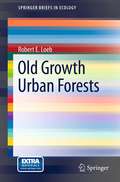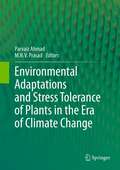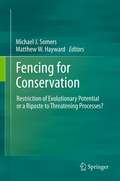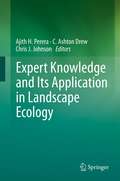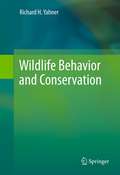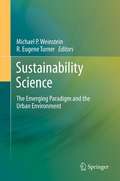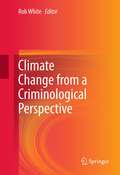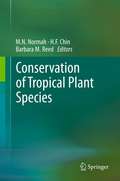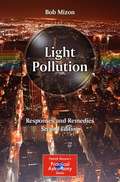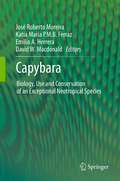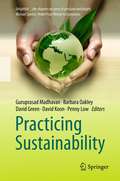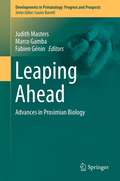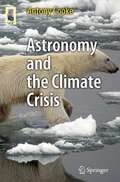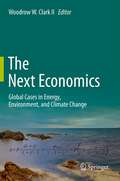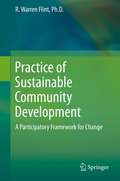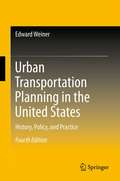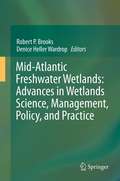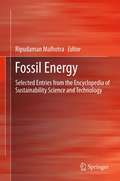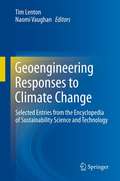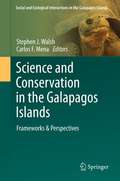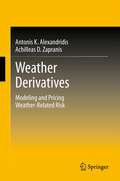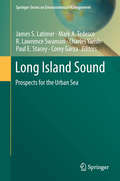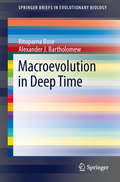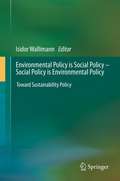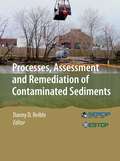- Table View
- List View
Old Growth Urban Forests
by Robert E. LoebMillions of urbanites never see primeval forests during their lives except for the old growth forests found in urban parks. Unfortunately, these forests are on the verge of disappearing because arboreal reproduction is lost to human trampling and park administrators and urban foresters do not maintain these "natural" forests. To aid urban foresters and park managers in meeting the challenges, research on old growth forests in urban parks is synthesized in terms of historical ecology to introduce the methods utilized to reveal long-term forest composition changes. The case study of three stands in Fairmount Park, Philadelphia, PA relates pre-chestnut blight tree species densities and post-chestnut blight arboreal changes to fire and visitor trampling. The information gained on how urban old growth forests have developed and changed is used to develop restoration ecology based frameworks to restore species composition and address challenges to forest survival including invasive species.
Environmental Adaptations and Stress Tolerance of Plants in the Era of Climate Change
by Parvaiz Ahmad M.N.V. PrasadClimate change is a complex phenomenon with a wide range of impacts on the environment. Biotic and abiotic stress are a result of climate change. Abiotic stress is caused by primary and secondary stresses which are an impediment to plant productivity. Prolonged exposure to these stresses results in altered metabolism and damage to biomolecules. Plants evolve defense mechanisms to withstand these stresses, e.g. synthesis of osmolytes, osmoprotectants, and antioxidants. Stress responsive genes and gene products including expressed proteins are implicated in conferring tolerance to the plant. This volume will provide the reader with a wide spectrum of information, including vital references. It also provides information as to how phytoconstituents, hormones and plant associated microbes help the plants to tolerate the stress. This volume also highlights the use of plant resources for ameliorating soil contaminants such as heavy metals. Dr. Parvaiz is Assistant professor in Botany at A.S. College, Srinagar, Jammu and Kashmir, India. He has completed his post-graduation in Botany in 2000 from Jamia Hamdard New Delhi India. After his Ph.D from the Indian Institute of Technology (IIT) Delhi, India in 2007 he joined the International Centre for Genetic Engineering and Biotechnology, New Delhi. He has published more than 20 research papers in peer reviewed journals and 4 book chapters. He has also edited a volume which is in press with Studium Press Pvt. India Ltd., New Delhi, India. Dr. Parvaiz is actively engaged in studying the molecular and physio-biochemical responses of different plants (mulberry, pea, Indian mustard) under environmental stress. Prof. M.N.V. Prasad is a Professor in the Department of Plant Sciences at the University of Hyderabad, India. He received B.Sc. (1973) and M.Sc. (1975) degrees from Andhra University, India, and the Ph.D. degree (1979) in botany from the University of Lucknow, India. Prasad had published 216 articles in peer reviewed journals and 82 book chapters and conference proceedings in the broad area of environmental botany and heavy metal stress in plants. He is the author, co-author, editor, or co-editor for eight books. He is the recipient of Pitamber Pant national Environment Fellowship of 2007 awarded by the Ministry of Environment and Forests, Government of India.
Fencing for Conservation
by Michael J. Somers Matthew HaywardThe conflict between increasing human population and biodiversity conservation is one of the IUCN's key threatening processes. Conservation planning has received a great deal of coverage and research as a way of conserving biodiversity yet, while theoretically successful, it has never been tested. Simple lines on maps to illustrate conservation areas are unlikely to be successful in the light of human encroachment. It may be that some form of overt display is necessary to ensure the protection of reserves. This may be signage, presence of guards/rangers or physical fencing structures. The need for some form of barrier goes beyond restricting human access. The megafauna of Africa pose a genuine threat to human survival. In southern Africa, fences keep animals in and protect the abutting human population. Elsewhere, fencing is not considered important or viable. Where poverty is rife, it won't take much to tip the balance from beneficial conservation areas to troublesome repositories of crop-raiders, diseases and killers. Conversely, in New Zealand fences are used to keep animals out. Introduced species have decimated New Zealand's endemic birds, reptiles and invertebrates, and several sites have been entirely encapsulated in mouse-proof fencing to ensure their protection. Australia faces the same problems as New Zealand, however surrounds its national parks with cattle fences. Foxes and cats are free to enter and leave at will, resulting in rapid recolonisation following poisoning campaigns. How long will these poison campaigns work before tolerance, aversion or resistance evolves in the introduced predator populations?
Expert Knowledge and Its Application in Landscape Ecology
by C. Ashton Drew Chris J. Johnson Ajith H. PereraTypically, landscape ecologists use empirical observations to conduct research and devise solutions for applied problems in conservation and management. In some instances, they rely on advice and input of experienced professionals in both developing and applying knowledge. Given the wealth of expert knowledge and the risks of its informal and implicit applications in landscape ecology, it is necessary to formally recognize and characterize expert knowledge and bring rigor to methods for its applications. In this context, the broad goal of this book is to introduce the concept of expert knowledge and examine its role in landscape ecological applications. We plan to do so in three steps: First we introduce the topic to landscape ecologists, explore salient characteristics of experts and expert knowledge, and describe methods used in capturing and formalizing that knowledge. Second, we present examples of research in landscape ecology from a variety of ecosystems and geographic locations that formally incorporate expert knowledge. These case studies address a range of topics that will interest landscape ecologists and other resource management and conservation professionals including the specific roles of expert knowledge in developing, testing, parameterizing, and applying models; estimating the uncertainty in expert knowledge; developing methods of formalizing and incorporating expert knowledge; and using expert knowledge as competing models and a source of alternate hypotheses. Third, we synthesize the state of knowledge on this topic and critically examine the advantages and disadvantages of incorporating expert knowledge in landscape ecological applications. The disciplinary subject areas we address are broad and cover much of the scope of contemporary landscape ecology, including broad-scale forest management and conservation, quantifying forest disturbances and succession, conservation of habitats for a range of avian and mammal species, vulnerability and conservation of marine ecosystems, and the spread and impacts of invasive plants. This text incorporates the collective experience and knowledge of over 35 researchers in landscape ecology representing a diverse range of disciplinary subject areas and geographic locations. Through this text, we will catalyze further thought and investigations on expert knowledge among the target readership of researchers, practitioners, and graduate students in landscape ecology.
Wildlife Behavior and Conservation
by Richard H. YahnerBegins with in-depth coverage of wildlife behavior concepts as they relate to conservation problems. Topics will focus principally on discussion, critique, and development of behavioral concepts, with particular attention given to published studies on various topics in wildlife behavioral concepts as related to conservation and natural history. He will include an extensive list of references.
Sustainability Science
by R. Eugene Turner Michael P. WeinsteinThe object of this book is to highlight how the nascent field of sustainability science is addressing a key challenges for scientists; that is, understanding the workings of complex systems especially when humans are involved. A consistent thread in the sustainability science movement is the wide acknowledgement that greater degrees of integration across what are now segmented dimensions of extant Science and Technology systems will be a key factor in matching the most appropriate science and technology solutions to specific sustainability problems in specific places.
Climate Change from a Criminological Perspective
by Rob WhiteFew would dispute the power of climate change to lead to profoundly destructive weather events. At the same time, the possibility of climate change as a consequence--or even a cause--of criminal events is far less recognized. As the earth grows warmer, issues regarding land use, water rights, bio-security, and food production and distribution will continue to have far-reaching impact, and produce more opportunity for offenses by individuals and groups as well as political and corporate entities. In Climate Change from a Criminological Perspective, a panel of pioneering green criminologists investigates an increasingly complex chain of ecological causes and effects. Illegal acts are analyzed as they contribute to environmental decline (e.g., wildlife poaching) or result from ecological distress (e.g., survival-related theft). Regulatory and other interventions are critiqued, concepts of environmental harm refined, and new research methodologies called for. And while individual events described are mainly local, the contributors keep the global picture, and substantial questions about human rights and social relationships, firmly in mind. Topics featured include: Global warming as corporate crime. Climate change and the courts: U.S. and global views. Climate change, natural disasters, and gender inequality. The roles and responsibilities of environmental enforcement networks. A sociocultural perspective on climate change denial. PLUS: instructive in-depth chapters on criminological aspects of Hurricane Katrina and the Japanese nuclear disaster. A volume of considerable timeliness and vision, Climate Change from a Criminological Perspective will be read and discussed, and will inspire action, by researchers in criminology, criminal justice, environmental studies, and related disciplines, as well as policymakers.
Conservation of Tropical Plant Species
by M. N. Normah H. F. Chin Barbara M. ReedThe book is designed to provide a review on the methods and current status of conservation of the tropical plant species. It will also provide the information on the richness of the tropical plant diversity, the need to conserve, and the potential utilization of the genetic resources. Future perspectives of conservation of tropical species will be discussed. Besides being useful to researchers and graduate students in the field, we hope to create a reference for a much wider audience who are interested in conservation of tropical plant diversity.
Light Pollution: Responses and Remedies (The Patrick Moore Practical Astronomy Series)
by Bob MizonThere have been many developments in the field of light pollution over the last few years, and this second edition of 'Light Pollution - Responses and Remedies' will introduce them in detail. Examples include the appearance of anti-light pollution legislation in various countries, new departures in lighting design, human health implications, and the growing realization among the general public that lighting is not always a good thing. In this title, author Bob Mizon discusses the various ways in which wasted artificial light has damaged the quality of modern life, and suggest solutions. This book is for anyone who has experienced glare, discomfort, or nuisance from poorly directed lights; has wondered why we waste so much money lighting the sky; or anyone who simply wants to see the stars instead of a baleful urban glow. "Light Pollution, 2nd Edition" offers practical and inexpensive solutions to the world-wide problem of wasted artificial light, and emphasizes that light pollution is not just an astronomers' problem, but affects everyone in various ways.
Capybara: Biology, Use and Conservation of an Exceptional Neotropical Species
by Emilio A. Herrera David W. Macdonald José Roberto Moreira Katia Maria FerrazThe capybara is the neotropical mammal with the highest potential for production and domestication. Amongst the favorable characteristics for domestication we can list its high prolificacy, rapid growth rate, a herbivorous diet, social behavior and relative tameness. The genus (with only two species) is found from the Panama Canal to the north of Argentina on the east of the Andes. Chile is the only country in South America where the capybara is not found. The species is eaten all over its range, especially by poor, rural and traditional communities engaged in subsistence hunting. On the other hand, in large urban settlements wildlife is consumed by city dwellers as a delicacy. The sustainable management of capybara in the wild has been adopted by some South American countries, while others have encouraged capybara rearing in captivity.
Practicing Sustainability
by David Green Barbara Oakley Penny Low Guru Madhavan David KoonSustainability applies to everybody. But everybody applies it differently, by defining and shaping it differently--much as water is edged and shaped by its container. It is conceived in absolute terms but underpinned by a great diversity of relatively "green"--and sometimes contradictory--practices that can each make society only more or less sustainable. In Practicing Sustainability, chefs, poets, music directors, evangelical pastors, skyscraper architects, artists, filmmakers, as well as scientific leaders, entrepreneurs, educators, business executives, policy makers, and the contrarians, shed light on our understanding of sustainability and the role that each of us can play. Each contributor addresses what sustainability means, what is most appealing about the concept, and what they would like to change to improve the perception and practice of sustainability. What emerges from their essays is a wide spectrum of views that confirm an important insight: Sustainability is pursued in different ways not only due to different interpretations, but also because of varying incentives, trade-offs, and altruistic motives. Practicing and achieving sustainability starts with a willingness to look critically at the concept. It also means enabling rich and vigorous discussion based on pragmatism and common sense to determine a framework for best ideas and practices. With time and the much needed critical thinking, sustainable development will become a more integral part of our culture. By sharing experiences and crisp insights from today's savants, Practicing Sustainability serves as a stepping stone to the future.
Leaping Ahead
by Fabien Génin Russell Tuttle Marco Gamba Judith MastersLeaping Ahead: Advances in Prosimian Biology presents a summary of the state of prosimian biology as we move into the second decade of the 21st century. The book covers a wide range of topics, from assessments of diversity and evolutionary scenarios, through ecophysiology, cognition, behavioral and sensory ecology, to the conservation and survival prospects of this extraordinary and diverse group of mammals. The collection was inspired by an international conference in Ithala, KwaZulu-Natal, South Africa in 2007, where prosimian biologists gathered from Canada, Finland, France, Germany, India, Italy, Japan, Madagascar, South Africa, Tanzania, the United Kingdom, and the United States of America. The meeting reverberated with the passion prosimian researchers feel for their study subjects and with their deep concern for the future of prosimians in the face of ongoing habitat destruction and the burgeoning threat of bushmeat hunting. Chapters for this volume were contributed by researchers from across the globe; they attest to the diversity, vibrancy and rapid growth of prosimian biology, and to the intellectual advances that have revolutionized this field in recent years. Since its earliest beginnings, prosimian research and its resultant literature have had a strong francophone component, and researchers in many prosimian habitat countries are more comfortable reading and writing in French rather than English. French summaries of all chapters have been included. The volume is targeted at researchers, both those entering the field and established scientists, who have an interest in the biology of primates and small mammals. It is also aimed at conservation biologists seeking a deeper understanding of the faunas and conservation developments in Africa, Madagascar and Southeast Asia, and anyone who has an interest in discovering the true diversity of our order, the Primates.
Astronomy and the Climate Crisis (Astronomers' Universe)
by Antony CookeClimate change is acknowledged as being one of the most important areas of research today. Increasing global temperatures will impact all of us to a greater or lesser extent. From the point of view of research it is an enormously important and complex subject. However, little attention is paid to its relationship to astronomy, the sun in particular but not exclusively. Though directed at an astronomically inclined readership, and providing some less well-known astronomically related information, studies and concepts, this book will also appeal to a broader public, who need to understand the subject of climate change and learn of all the various theories and possible solutions.
The Next Economics
by Woodrow W. Clark IIThe Next Economics focuses on how the field of economics must change and incorporate environment, energy, health and new technologies that are called externalities for stopping and reversing climate change. The field of economics needs to become a science. Economics in this book for the Green Industrial Revolution which goes beyond the third industrial revolution since it covers cases, examples and specific economic analyses that both scientific and global. The book concerns climate change and how the Economics for Externalities, needs to range from energy and national security to infrastructure and communities. Solutions and cases of the "Next Economics" are based in western philosophical economic paradigms and how that is changing due to the significance of current global economic and societal concerns. Finally practical applications for economics are explored using global environmental and energy issues. Areas that need a fresh look at and be integrated with economics, include the environment, social and political issues, energy, health climate change and their infrastructures, as they are major components of the macroeconomics for the future. Based on past economic models, these subjects have been lost or ill fitted into modern economic theory. The challenge is to explore and to look deeply into economics in order to provide it a new direction with the possibility for understanding, changing and saving the planet from climate change. This book presents to economists and policy-makers alike areas of environmental economics, energy policy, health and social issues which are needed to stop and reverse climate change.
Practice of Sustainable Community Development
by R. Warren FlintOrdinary people, community leaders, and even organizations and corporations still do not fully comprehend the interconnected, "big picture" dynamics of sustainability theory and action. In exploring means to become more sustainable, individuals and groups need a reference in which to frame discussions so they will be relevant, educational, and successful when implemented. This book puts ideas on sustainable communities into a conceptual framework that will promote striking, transformational effects on decision-making. In this book practitioners and community leaders will find effective, comprehensive tools and resources at their finger-tips to facilitate sustainable community development (SCD). The book content examines a diverse range of SCD methods; assessing community needs and resources; creating community visions; promoting stakeholder interest and participation; analyzing community problems; designing and facilitating strategic planning; carrying out interventions to improve
Urban Transportation Planning in the United States: History, Policy, and Practice, 4th Edition
by Edward WeinerThe development of U.S. urban transportation policy over the past 50 years illustrates the changing relationships among federal, state, and local governments. This comprehensive text examines the evolution of urban transportation planning from early developments in highway planning in the 1930s to today's concerns over sustainable development, security, and pollution control. Focusing on major national events, the book discusses the influence of legislation, regulations, conferences, federal programs, and advances in planning procedures and technology. The book focuses in-depth at the most significant event in transportation planning--the Federal-Aid Highway Act of 1962; creating a federal mandate for a comprehensive urban transportation planning process carried out cooperatively by states and local governments with federal funding, this act was crucial in the spread of urban transportation. Claiming that urban transportation planning is more sophisticated, costly, and complex than its highway and transit planning predecessors, the book demonstrates how urban transportation planning evolved in response to changes in such factors as environment, energy, development patterns, intergovernmental coordination, and federal transit programs. It further illustrates how broader concerns for global climate change and sustainable development have braided the purview of transportation planning. This fully updated, revised, and expanded edition highlights the dynamics of transportation planning post-9/11, covers the impact of recent legislation, emphasizes such timely issues as security, oil dependence, performance measurement, and public-private sector collaboration.
Mid-Atlantic Freshwater Wetlands: Advances in Wetlands Science, Management, Policy, and Practice
by Denice Heller Wardrop Robert P. BrooksThe lands and waters of the Mid-Atlantic Region (MAR) have changed significantly since before the 16th century when the Susquehannock lived in the area. Much has changed since Captain John Smith penetrated the estuaries and rivers during the early 17th century; since the surveying of the Mason-Dixon Line to settle border disputes among Maryland, Pennsylvania, and Delaware during the middle of the 18th century; and since J. Thomas Scharf described the physiographic setting of Baltimore County in the late 19th century. As early as 1881, Scharf provides us with an assessment of the condition of the aquatic ecosystems of the region, albeit in narrative form, and already changes are taking place - the conversion of forests to fields, the founding of towns and cities, and the depletion of natural resources. We have always conducted our work with the premise that "man" is part of, and not apart from, this ecosystem and landscape. This premise, and the historical changes in our landscape, provide the foundation for our overarching research question: how do human activities impact the functioning of aquatic ecosystems and the ecosystem services that they provide, and how can we optimize this relationship?
Fossil Energy
by Ripudaman MalhotraThe word sustainability shares its root with sustenance. In the context of modern society, sustenance is inextricably linked to the use of energy. Fossil Energy provides an authoritative reference on all aspects of this key resource, which currently represents nearly 85% of global energy consumption. Gathering 16 peer-reviewed entries from the Encyclopedia of Sustainability Science and Technology, the chapters provide comprehensive, yet concise coverage of fundamentals and current areas of research. Written by recognized authorities in the field, this volume represents an essential resource for scientists and engineers working on the development of energy resources, fossil or alternative, and reflects the essential role of energy supplies in supporting a sustainable future.
Geoengineering Responses to Climate Change
by Naomi Vaughan Tim LentonFailure by the international community to make substantive progress in reducing CO2 emissions, coupled with recent evidence of accelerating climate change, has brought increasing urgency to the search for additional remediation approaches. This book presents a selection of state-of-the-art geoengineering methods for deliberately reducing the effects of anthropogenic climate change, either by actively removing greenhouse gases from the atmosphere or by decreasing the amount of sunlight absorbed at the Earth's surface. These methods contrast with more conventional mitigation approaches which focus on reducing emissions of greenhouse gases, especially carbon dioxide. Geoengineering technologies could become a key tool to be used in conjunction with emissions reduction to limit the magnitude of climate change. Featuring authoritative, peer-reviewed entries from the Encyclopedia of Sustainability Science and Technology, this book presents a wide range of climate change remediation technologies.
Science and Conservation in the Galapagos Islands
by Stephen J. Walsh Carlos F. MenaIn this launch of the Galapagos series, this book provides a broad "framing" assessment of the current status of social and ecological systems in the Galapagos Islands, and the feedback that explicitly links people to the environment. It also highlights the challenges to conservation imposed by tourism in the Galapagos Islands and the attendant migration of people from mainland Ecuador to service the burgeoning tourism industry. Further, there is an emphasize on the status of the terrestrial and marine environments that form the very foundation of the deep attraction to the Islands by tourists, residents, scholars, and conservationists.
Weather Derivatives
by Achilleas D. Zapranis Antonis Alexandridis K.Weather derivatives are financial instruments that can be used by organizations or individuals as part of a risk management strategy to minimize risk associated with adverse or unexpected weather conditions. Just as traditional contingent claims, a weather derivative has an underlying measure, such as: rainfall, wind, snow or temperature. Nearly $1 trillion of the U.S. economy is directly exposed to weather-related risk. More precisely, almost 30% of the U.S. economy and 70% of U.S. companies are affected by weather. The purpose of this monograph is to conduct an in-depth analysis of financial products that are traded in the weather market. Presenting a pricing and modeling approach for weather derivatives written on various underlying weather variables will help students, researchers, and industry professionals accurately price weather derivatives, and will provide strategies for effectively hedging against weather-related risk. This book will link the mathematical aspects of the modeling procedure of weather variables to the financial markets and the pricing of weather derivatives. Very little has been published in the area of weather risk, and this volume will appeal to graduate-level students and researchers studying financial mathematics, risk management, or energy finance, in addition to investors and professionals within the financial services industry.
Long Island Sound
by James S. Latimer Mark A. Tedesco R. Lawrence Swanson Charles Yarish Paul E. Stacey Corey GarzaThe U. S. Ocean Commission Report identified the need for regional ecosystem assessments to support coastal and ocean management. These assessments must provide greater understanding of physical and biological dynamics than assessments at global and national scales can provide but transcend state and local interests. This need and timeliness is apparent for Long Island Sound, where a multi-state regional restoration program is underway for America's most urbanized estuary. Synthesis of the Long Island Sound ecosystem is needed to integrate knowledge across disciplines and provide insight into understanding and managing pressing issues, such as non-point sources of pollution, coastal development, global climatic change, and invasive species. Currently, there is a need for a comprehensive volume that summarizes the ecological and environmental dynamics and status of Long Island Sound and its myriad ecosystems. It has been 30 years since a comprehensive summary of Long Island Sound was prepared and 50 years since the pioneering work of Gordon Riley. Major advances in estuarine science are providing new insights into these systems, and yet, the condition of many estuaries is in decline in the face of continuing coastal development. There is an opportunity to lay a foundation for integrative coastal observing systems that truly provide the foundation for improved decision-making. This book will provide a key reference of our scientific understanding for work performed over the past three decades and guide future research and monitoring in a dynamic urbanized estuary.
Macroevolution in Deep Time
by Alexander J. Bartholomew Rituparna BoseThe prerequisite to investigating the underlying causes behind mass extinction is a profound understanding of the evolutionary history of both living and dead species. It is especially important to appreciate the significance of such studies in extinct organisms; especially in organisms that were abundant in a certain geologic era, but have subsequently dwindled or become extinct. Such studies should help to accurately evaluate patterns of evolution in extinct species lineages and help predict the same in its modern analogs. The book includes cutting edge research in evolutionary biology that should serve as a starting point for conservation.
Environmental Policy is Social Policy – Social Policy is Environmental Policy
by Isidor WallimannThis book argues that social and environmental policy should be synthetically treated as one and the same field, that both are but two aspects of the same coin - if sustainability is the goal. Such a paradigm shift is indicated, important, and timely to effectively move towards sustainability. This book is the first to take this approach and to give examples for it. Not to synthetically merge the two fields has been and will continue to be highly insufficient, inefficient and contradictory for policy and public administration aiming for a transformation towards a sustainable world. In general, social problems are dealt with in one "policy corner" and environmental problems in another. Rarely is social policy (at large) concerned with its impact on the environment or its connection with and relevance to environmental policy. Equally, environmental problems are generally not seen in conjunction with social policy, even though much environmental policy directly relates to health, nutrition, migration and other issues addressed by social policy. This book intends to correct the pattern to separate these very significant and large policy fields. Using examples from diverse academic and applied fields, it is shown how environmental policy can (and should) be thought of as social policy - and how social policy can (and should) simultaneously be seen as environmental policy. Tremendous benefits are to be expected.
Processes, Assessment and Remediation of Contaminated Sediments
by Danny D. ReibleThe purpose of this book is to help engineers and scientists better understand contaminated sediment sites and identify and design remedial approaches that are more efficient and effective. Contaminated sediment management is a difficult and costly exercise that is rarely addressed with easily identified and implemented remedies. It is hoped that this book can help identify and implement management approaches that provide an optimal, if not entirely satisfactory, solution to sediment contaminant problems.
